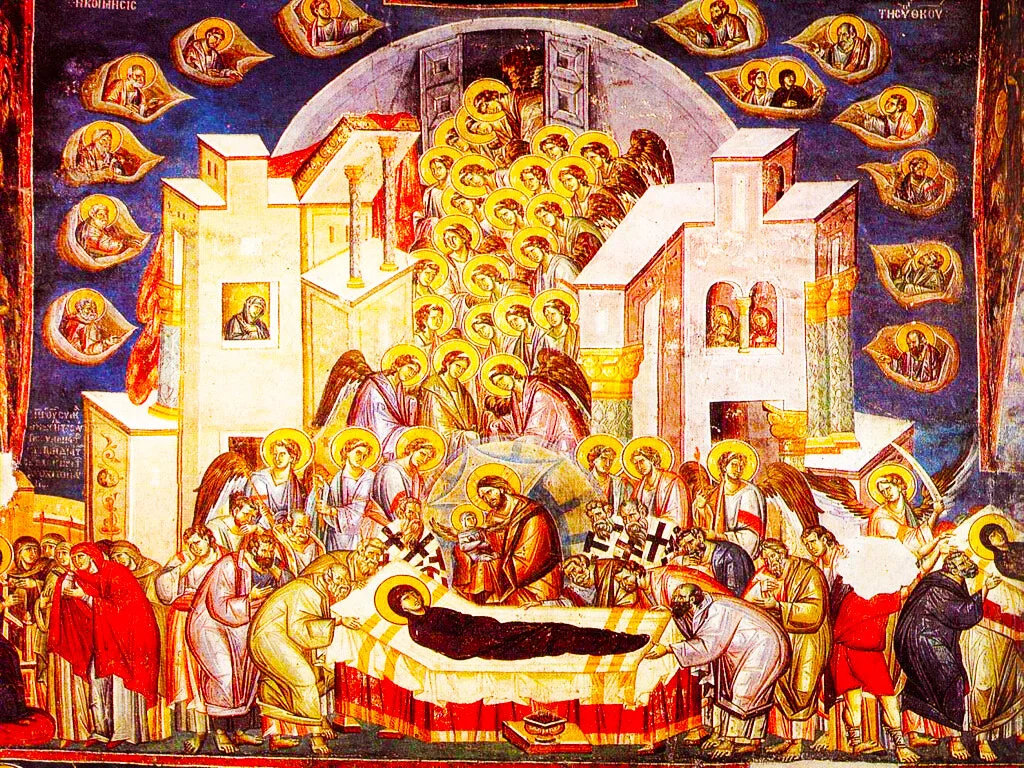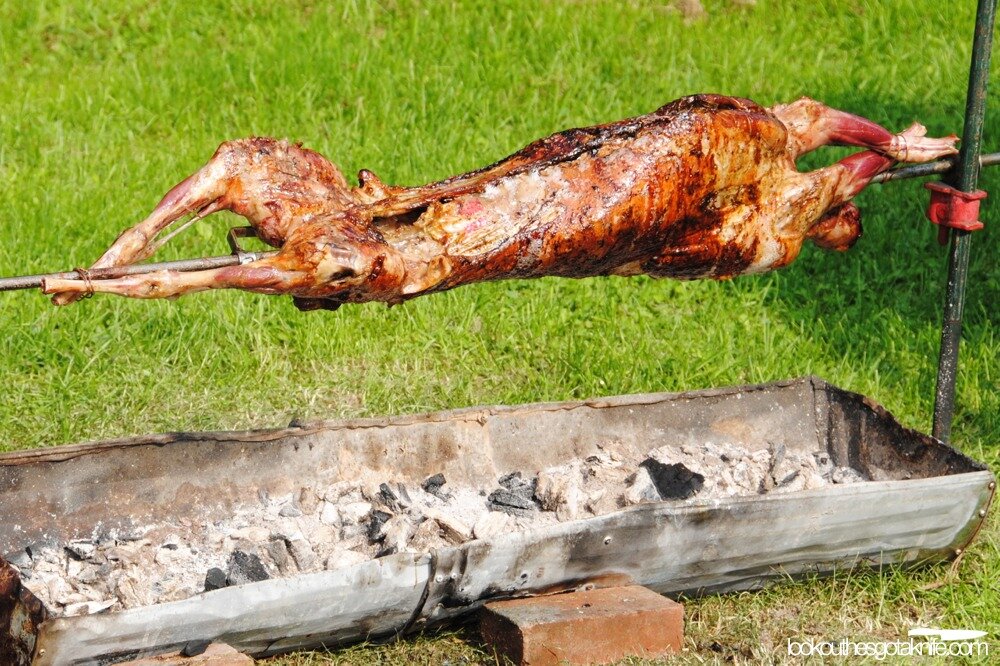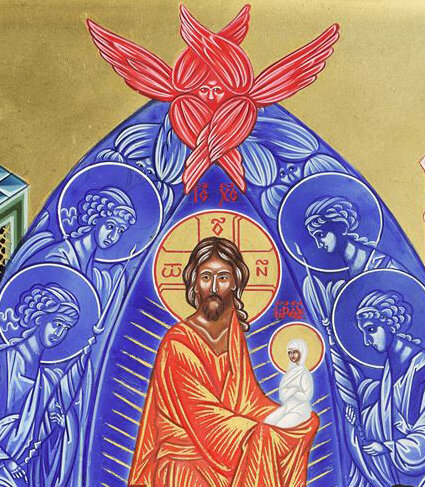by Fr Gabriel-Allan Boyd
This coming Saturday, we commemorate the Falling Asleep of the Theotokos, Mary. Of course, when we say “falling asleep,” we’re referring to her passing from this life to the next…her death. It’s a kind of funeral for a beloved family member...and yet there’s also something significantly more to it...and thus it’s a major feast-day of the Church.
Across the world as a result of this pandemic, death and funerals have been on people’s minds lately. Even if you don’t personally know anyone who’s died from the virus, the press has certainly been hyper-vigilant in keeping people in a constant state of anxiety over the possibility of our loved ones dying. This feast-day, however, offers us a fuller way to engage with the mystery of death and life, since we will all, eventually, die anyway.
A few years ago, when I traveled through Albania…and then later through Greece, I saw a significance given to this feast-day very different from the level of importance that Americans typically observe in it. Just as people will normally drop everything for the funeral of a beloved friend, most of these people throughout the Balkans took the day off from work out of respect for the Theotokos. Their lives came to a sobering halt to be in liturgy for this feast, no matter what day it fell on. Not only was this like going to the funeral of a beloved friend, but there was also something more to this feast-day—a joyfulness added to their sorrow—much like what happens to us at Pascha. In fact, at one of the places where I traveled, after the Divine Liturgy, it was something of a cross between a giant tail-gate party and a Pascha picnic. The open trunks of cars were filled with various festive foods and libations. People were sitting around their cars in lawn chairs, relishing their relationships with each other. Lots of folks had their blankets spread out on the grass for their families. Scattered throughout the park, there were several lambs roasting on the spit. Drinks were being poured…and joyful toasts for blessed-life were being made. But, why? Why would Christians make such a celebration out of a religious observance that commemorates the death of someone so beloved as the Theotokos?
It begins with the Church’s use of the expression, “falling asleep.” Of course, the Church is offering us much more than just a nice euphemism to make us feel better about our holy mother’s dying. There’s powerful meaning behind this phrase, “falling asleep.” The theme of the liturgical hymns and prayers surrounding the Dormition remind us that the Mother of Life has passed over into the heavenly joy, into the divine gladness and unending delight of the Kingdom of her Son. So, because of her Son’s physical resurrection, her physical death becomes a point of great joy—merely a sleep—through which she awakens in His divine glory. Saint John of Damascus called it, “the deathless death.” The hymns tell us that as the actual first-century funeral of the Theotokos is being held, both the multitude of angels and all of those living on earth overflow with elation. “Heaven is glad, and angelic hosts celebrate with joy; and the inhabitants of the earth are jubilant as they sing funeral anthems unto you as the Mother of Him who rules over the entire world.” It reminds me of the way Greeks sing the Lamentation Hymns on Holy Friday...full of joy, in anticipation of the resurrection they know is coming!
At first glance, it’s easy to understand why the angels would be so joyful. They now have the Mother of God in their midst…but why would the inhabitants of the earth be so jubilant? Shouldn’t they be sad? The Queen of Heaven is no longer physically in their midst. Of course, the icon of the feast shows our Lord’s disciples gathered around the Theotokos in great mourning. So, why do the hymns tell us that when she is assumed into heaven, their sadness is turned to joy? Because, in this final event, as Christ escorts her soul into His everlasting resurrection, her capacity for prayerfully uniting the things on earth with the things in heaven is heightened. “And when they saw you were taken up from the earth into the heights, full of joy they cried aloud the salutation of Gabriel: Rejoice, O chariot of the Godhead; rejoice, the only woman who in childbirth united the things of earth with the things on high.” She personifies the truth of Christ’s resurrection for all the rest of us…a source of boundless joy!
What an amazing paradox! While this Feast is called the “Falling Asleep of the Theotokos,” in reality, it’s the culmination of a life lived in loving unity with her Son and of her victory over death through Him. It’s a celebration of her “Passover” from this life into life eternal. It’s a jubilant confirmation of our own promised resurrection in Christ. Mary’s Dormition is a sign of God’s faithfulness to all of humanity…especially to those who faithfully follow her Son like she did. As He raises her from the dead, so also, He raises the rest of us. This is why you’ll sometimes hear people refer to this feast-day as the “Summer Pascha.” The hymns of the feast affirm that the Virgin Mary experienced her own personal Pascha (Passover) by passing through death and rising to eternal life. Saint John of Damascus shines a light on this great mystery, saying, “O how does the source of life pass through death to life? She dies according to the flesh, destroys death by death, and through corruption gains incorruption, and makes her death the source of resurrection.” Thus, we now have a different way of looking at our own imminent death and the impending death of our loved ones, not in a constant state of anxiety, as the press and politicians would have us...but rather, as passing from this life to the next. And being alive in heaven, as Queen and Mother of our Lord, we can now ask her intercessions to help us transform our own impending death into her same experience of victory over death.
At this Saturday’s Epistle Reading, Saint Paul’s speaks of Christ’s self-emptying love on your behalf…and of His loving willingness to descend into human servitude and disgraceful death, which is the reason that God the Father “highly exalted” him (Philippians 2:5-11). Earlier, in verse 2 of that same Chapter, we’re told to be like-minded with Christ, also offering the kind of love that pours itself out on behalf of others. And in the Dormition liturgy’s Gospel Reading that Mary’s blessedness belongs to all who “hear the word of God and keep it” (Luke 11:27-28). Since none of us are going to make it out of here alive...participating in the Dormition services of the Theotokos is about preparing us to meet our own fate—death—with the same beauty and dignity and meaning that she had. To enter God’s presence with “our souls magnifying the Lord and our Spirit rejoicing in God our Savior.”







